�
APPLIED SOIL MECHANICS
Applied Soil Mechanics: with ABAQUS Applications. Sam Helwany
© 2007 John Wiley & Sons, Inc. ISBN: 978-0-471-79107-2
APPLIED SOIL
MECHANICS
with ABAQUS Applications
SAM HELWANY
JOHN WILEY & SONS, INC.
�
Copyright 2007 by John Wiley & Sons, Inc., Hoboken, New Jersey. All rights reserved.
Published by John Wiley & Sons, Inc.
Published simultaneously in Canada
Wiley Bicentennial Logo: Richard J. Pacifico
No part of this publication may be reproduced, stored in a retrieval system, or transmitted in any form
or by any means, electronic, mechanical, photocopying, recording, scanning, or otherwise, except as
permitted under Section 107 or 108 of the 1976 United States Copyright Act, without either the prior
written permission of the Publisher, or authorization through payment of the appropriate per-copy fee
to the Copyright Clearance Center, Inc., 222 Rosewood Drive, Danvers, MA 01923, (978) 759-8400,
fax (978) 646-8600, or on the web at www.copyright.com. Requests to the Publisher for permission
should be addressed to the Permissions Department, John Wiley & Sons, Inc., 111 River Street,
Hoboken, NJ 07030, (201) 748-6011, fax (201) 748-6008, or online at
http://www.wiley.com/go/permissions.
Limit of Liability/Disclaimer of Warranty: While the publisher and author have used their best efforts
in preparing this book, they make no representations or warranties with respect to the accuracy or
completeness of the contents of this book and specifically disclaim any implied warranties of
merchantability or fitness for a particular purpose. No warranty may be created or extended by sales
representatives or written sales materials. The advice and strategies contained herein may not be
suitable for your situation. You should consult with a professional where appropriate. Neither the
publisher nor author shall be liable for any loss of profit or any other commercial damages, including
but not limited to special, incidental, consequential, or other damages.
For general information on our other products and services please contact our Customer Care
Department within the United States at (800) 762-2974, outside the U.S. at (317) 572-3993 or
fax (317) 572-4002.
Wiley also publishes its books in a variety of electronic formats. Some content that appears in print,
however, may not be available in electronic books. For more information about Wiley products, visit
our web site at www.wiley.com.
Library of Congress Cataloging-in-Publication Data:
Helwany, Sam, 1958-
Applied soil mechanics with ABAQUS applications / Sam Helwany.
p. cm.
Includes index.
ISBN 978-0-471-79107-2 (cloth)
1. Soil mechanics. 2. Finite element method. 3. ABAQUS. I. Title.
TA710.H367 2007
624.1’5136–dc22
2006022830
Printed in the United States of America.
10 9 8 7 6 5 4 3 2 1
�
To the memory
of my parents
�
CONTENTS
PREFACE
1 PROPERTIES OF SOIL
1.1
1.2
Soil Formation / 1
Physical Parameters of Soils / 3
1.2.1 Relative Density / 7
1.3 Mechanical Properties of Soil / 8
1.3.1 Sieve Analysis / 8
1.3.2 Hydrometer Analysis / 10
Soil Consistency / 11
1.4.1 Liquid Limit / 12
1.4.2 Plastic Limit / 12
1.4.3 Shrinkage Limit / 12
Plasticity Chart / 13
Classification Systems / 14
Compaction / 16
1.4
1.5
1.6
1.7
2 ELASTICITY AND PLASTICITY
2.1
2.2
Introduction / 21
Stress Matrix / 22
xiii
1
21
vii
�
viii
CONTENTS
2.3
Elasticity / 23
2.3.1 Three-Dimensional Stress Condition / 23
2.3.2 Uniaxial Stress Condition / 24
2.3.3 Plane Strain Condition / 25
2.3.4 Plane Stress Condition / 27
Plasticity / 28
2.4
2.5 Modified Cam Clay Model / 28
2.5.1 Normal Consolidation Line and Unloading–Reloading
Lines / 30
2.5.2 Critical-State Line / 33
2.5.3 Yield Function / 36
2.5.4 Hardening and Softening Behavior / 36
2.5.5 Elastic Moduli for Soil / 38
2.5.6 Summary of Modified Cam Clay Model Parameters / 39
2.5.7
2.5.8 Calculations of the Consolidated–Drained Stress–Strain
Incremental Plastic Strains / 40
Behavior of a Normally Consolidated Clay Using the Modified
Cam Clay Model / 42
2.5.9 Step-by-Step Calculation Procedure for a CD Triaxial Test on
NC Clays / 44
2.5.10 Calculations of the Consolidated–Undrained Stress–Strain
Behavior of a Normally Consolidated Clay Using the Modified
Cam Clay Model / 47
2.5.11 Step-by-Step Calculation Procedure for a CU Triaxial Test on
NC Clays / 49
2.6
2.7
2.5.12 Comments on the Modified Cam Clay Model / 53
Stress Invariants / 53
2.6.1 Decomposition of Stresses / 55
Strain Invariants / 57
2.7.1 Decomposition of Strains / 57
Extended Cam Clay Model / 58
2.8
2.9 Modified Drucker–Prager/Cap Model / 61
2.9.1 Flow Rule / 63
2.9.2 Model Parameters / 64
2.10 Lade’s Single Hardening Model / 68
2.10.1 Elastic Behavior / 68
2.10.2 Failure Criterion / 68
2.10.3 Plastic Potential and Flow Rule / 69
2.10.4 Yield Criterion / 72
�
CONTENTS
ix
2.10.5 Predicting Soil’s Behavior Using Lade’s Model: CD Triaxial
Test Conditions / 82
3 STRESSES IN SOIL
90
3.1
3.2
3.3
Introduction / 90
In Situ Soil Stresses / 90
3.2.1 No-Seepage Condition / 93
3.2.2 Upward-Seepage Conditions / 97
3.2.3 Capillary Rise / 99
Stress Increase in a Semi-Infinite Soil Mass Caused by External
Loading / 101
3.3.1 Stresses Caused by a Point Load (Boussinesq Solution) / 102
3.3.2 Stresses Caused by a Line Load / 104
3.3.3 Stresses Under the Center of a Uniformly Loaded Circular
3.3.4 Stresses Caused by a Strip Load (B/L ≈ 0) / 114
3.3.5 Stresses Caused by a Uniformly Loaded Rectangular
Area / 109
Area / 116
4 CONSOLIDATION
124
4.1
4.2
4.3
4.4
Introduction / 124
One-Dimensional Consolidation Theory / 125
4.2.1 Drainage Path Length / 127
4.2.2 One-Dimensional Consolidation Test / 127
Calculation of the Ultimate Consolidation Settlement / 131
Finite Element Analysis of Consolidation Problems / 132
4.4.1 One-Dimensional Consolidation Problems / 133
4.4.2 Two-Dimensional Consolidation Problems / 147
5 SHEAR STRENGTH OF SOIL
162
5.1
5.2
5.3
5.4
Introduction / 162
Direct Shear Test / 163
Triaxial Compression Test / 170
5.3.1 Consolidated–Drained Triaxial Test / 172
5.3.2 Consolidated–Undrained Triaxial Test / 180
5.3.3 Unconsolidated–Undrained Triaxial Test / 185
5.3.4 Unconfined Compression Test / 186
Field Tests / 186
5.4.1 Field Vane Shear Test / 187
�
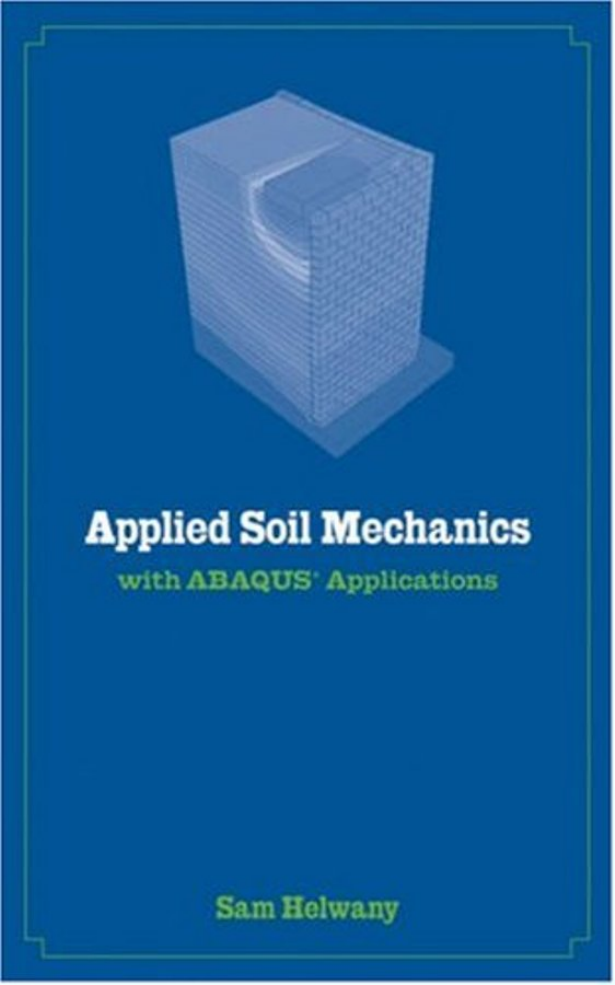
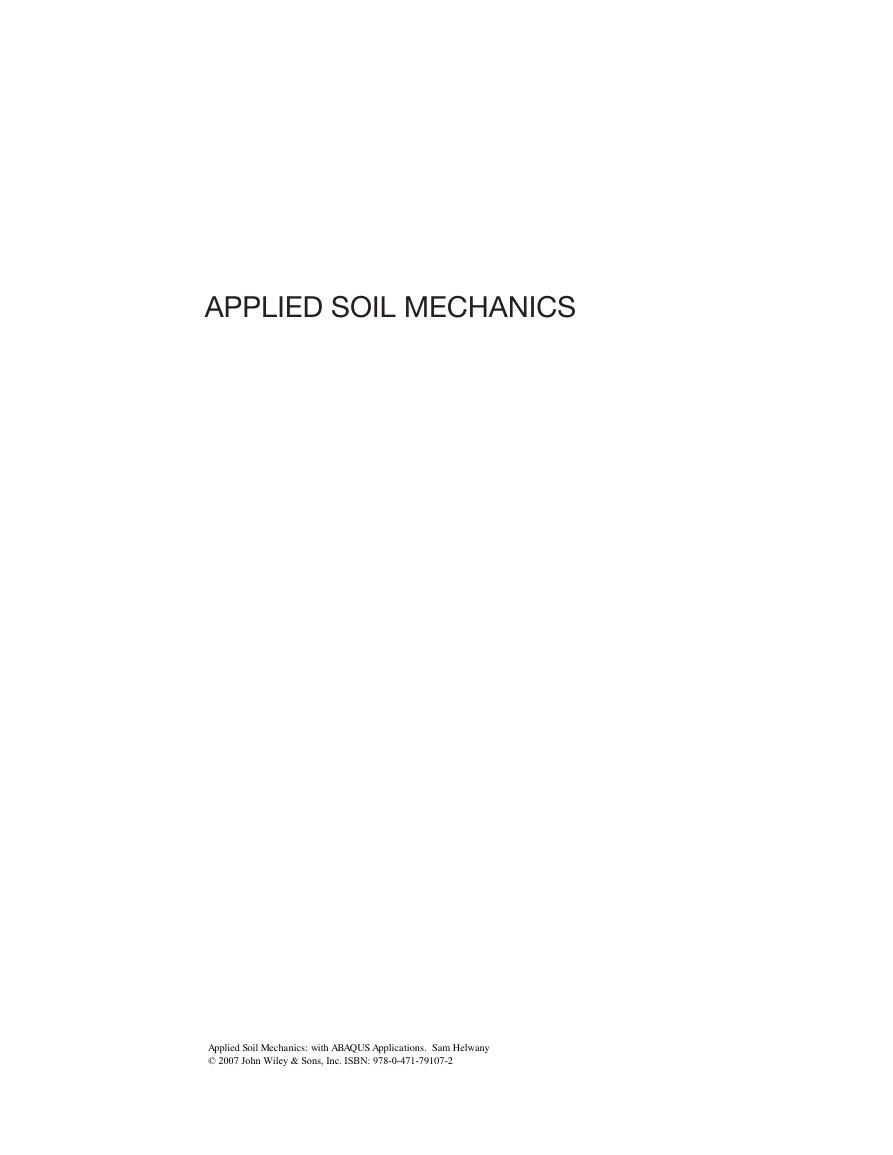
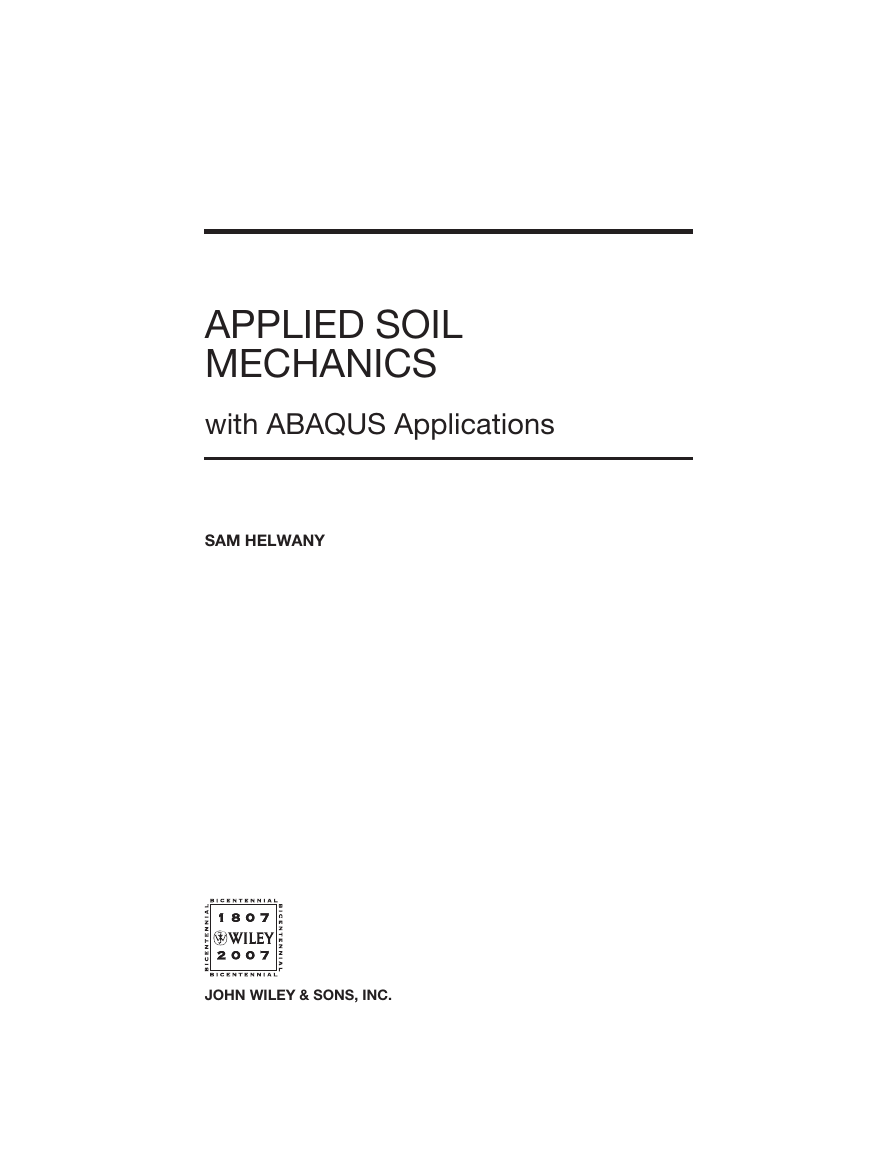
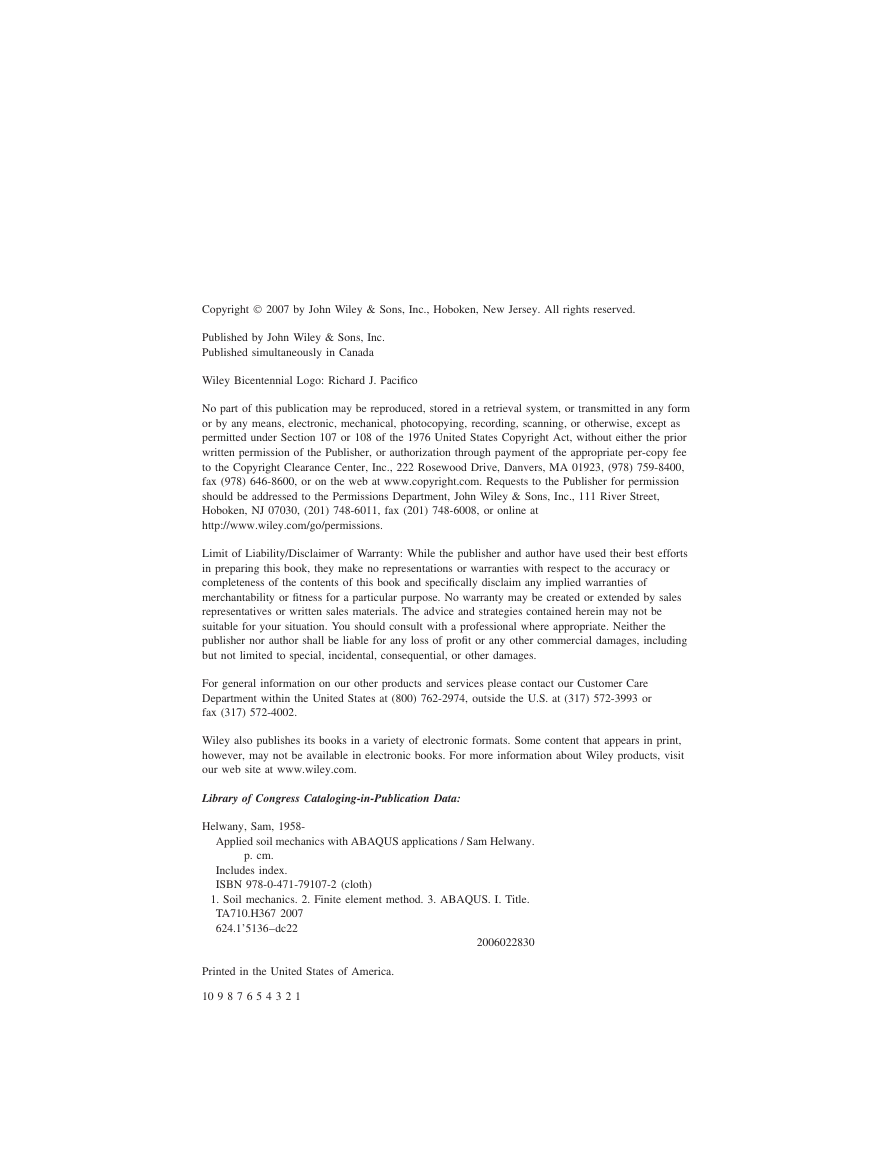
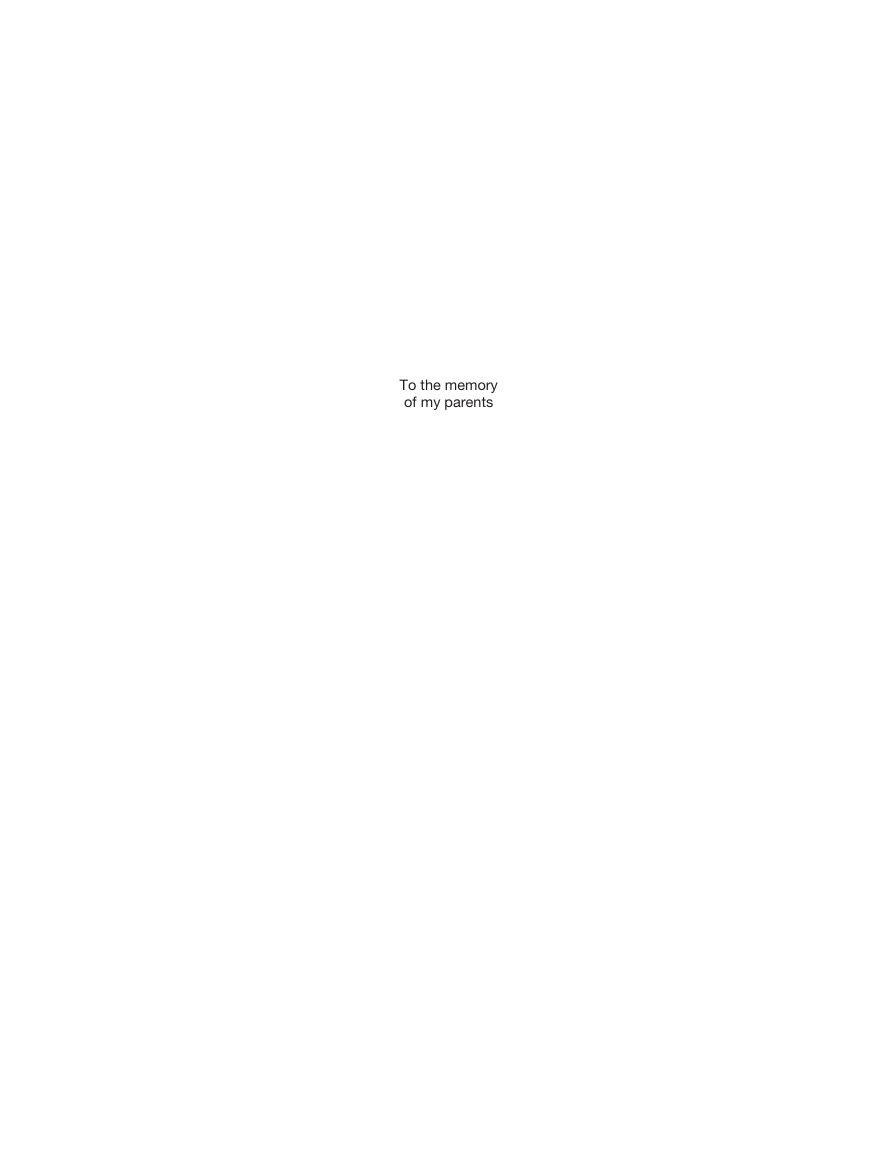
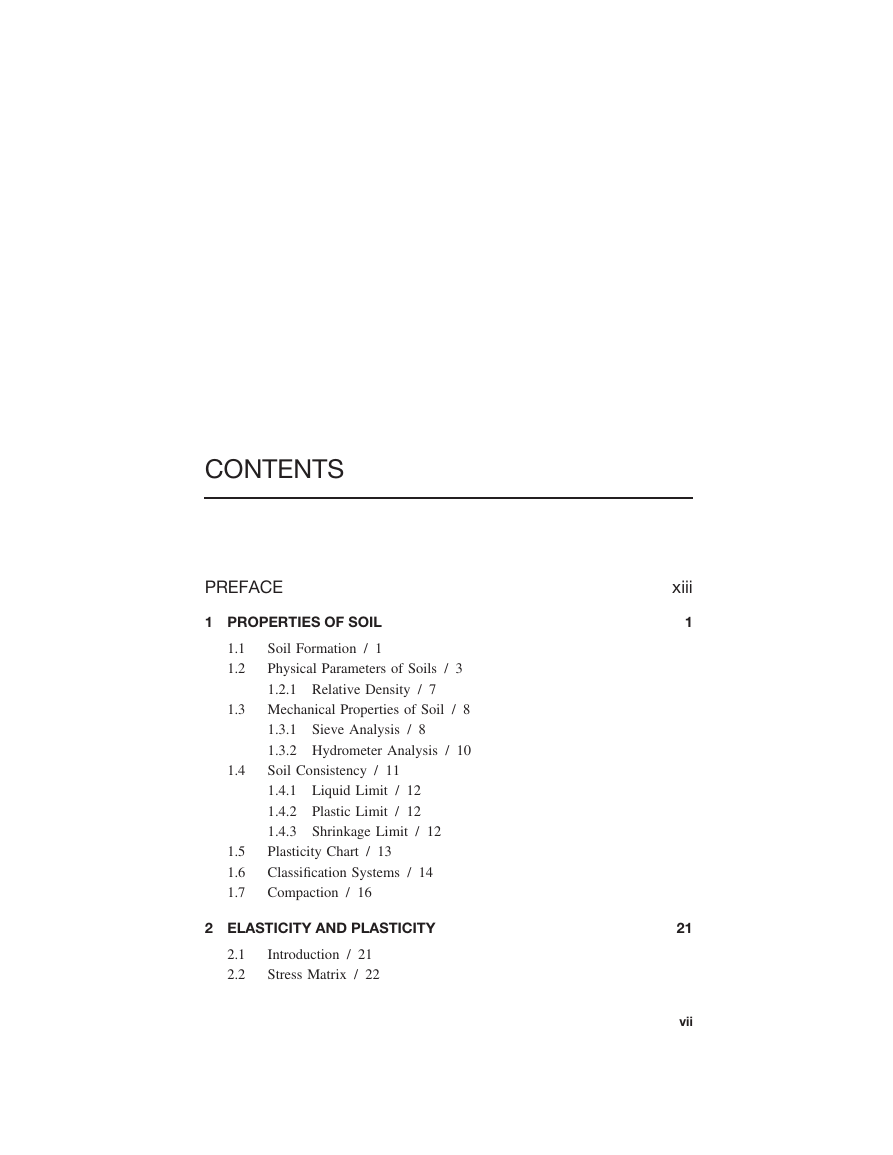
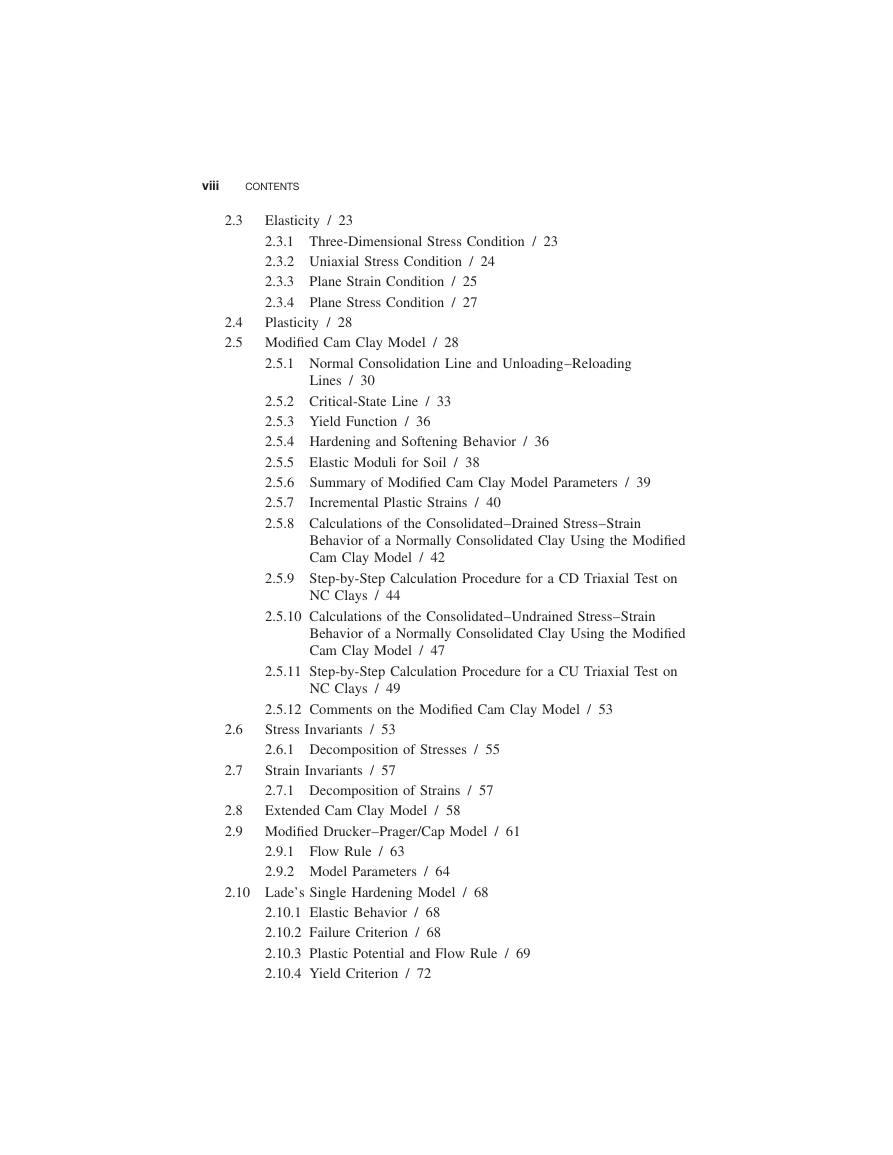
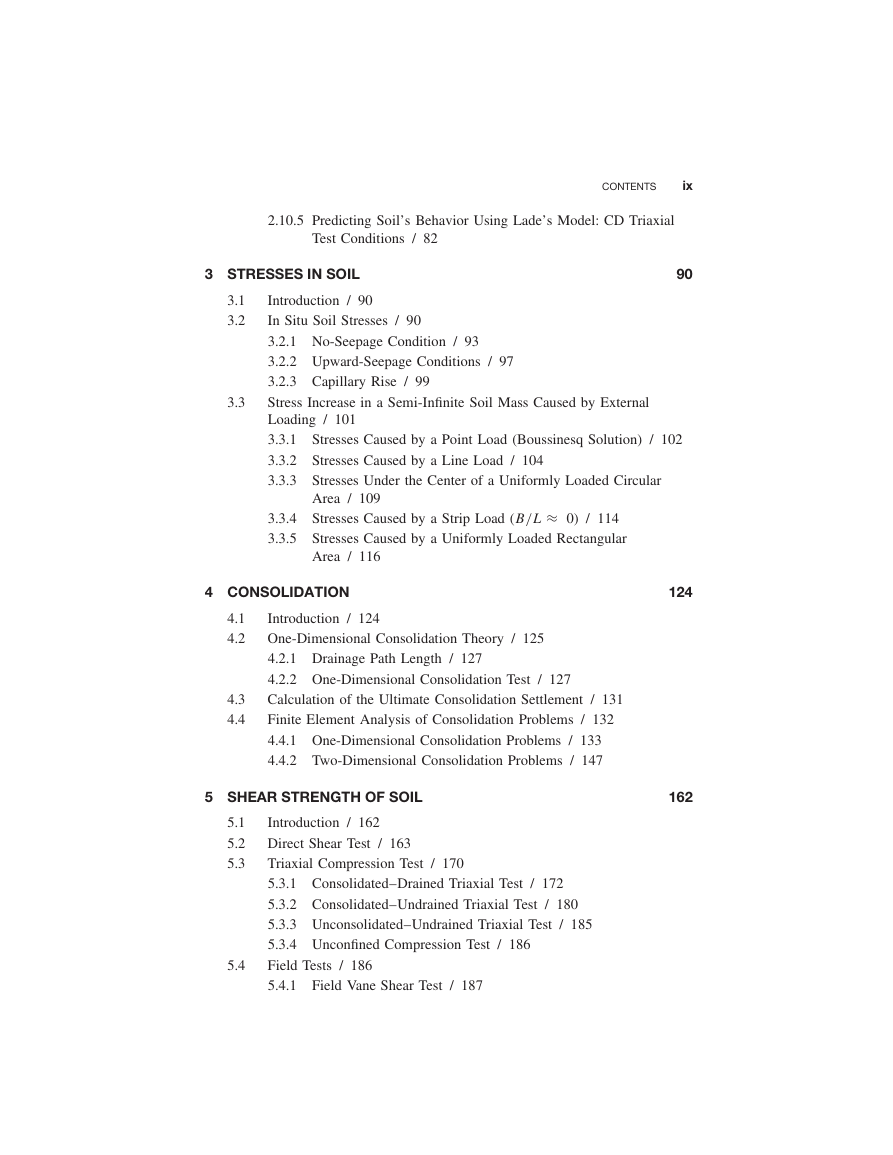








 2023年江西萍乡中考道德与法治真题及答案.doc
2023年江西萍乡中考道德与法治真题及答案.doc 2012年重庆南川中考生物真题及答案.doc
2012年重庆南川中考生物真题及答案.doc 2013年江西师范大学地理学综合及文艺理论基础考研真题.doc
2013年江西师范大学地理学综合及文艺理论基础考研真题.doc 2020年四川甘孜小升初语文真题及答案I卷.doc
2020年四川甘孜小升初语文真题及答案I卷.doc 2020年注册岩土工程师专业基础考试真题及答案.doc
2020年注册岩土工程师专业基础考试真题及答案.doc 2023-2024学年福建省厦门市九年级上学期数学月考试题及答案.doc
2023-2024学年福建省厦门市九年级上学期数学月考试题及答案.doc 2021-2022学年辽宁省沈阳市大东区九年级上学期语文期末试题及答案.doc
2021-2022学年辽宁省沈阳市大东区九年级上学期语文期末试题及答案.doc 2022-2023学年北京东城区初三第一学期物理期末试卷及答案.doc
2022-2023学年北京东城区初三第一学期物理期末试卷及答案.doc 2018上半年江西教师资格初中地理学科知识与教学能力真题及答案.doc
2018上半年江西教师资格初中地理学科知识与教学能力真题及答案.doc 2012年河北国家公务员申论考试真题及答案-省级.doc
2012年河北国家公务员申论考试真题及答案-省级.doc 2020-2021学年江苏省扬州市江都区邵樊片九年级上学期数学第一次质量检测试题及答案.doc
2020-2021学年江苏省扬州市江都区邵樊片九年级上学期数学第一次质量检测试题及答案.doc 2022下半年黑龙江教师资格证中学综合素质真题及答案.doc
2022下半年黑龙江教师资格证中学综合素质真题及答案.doc